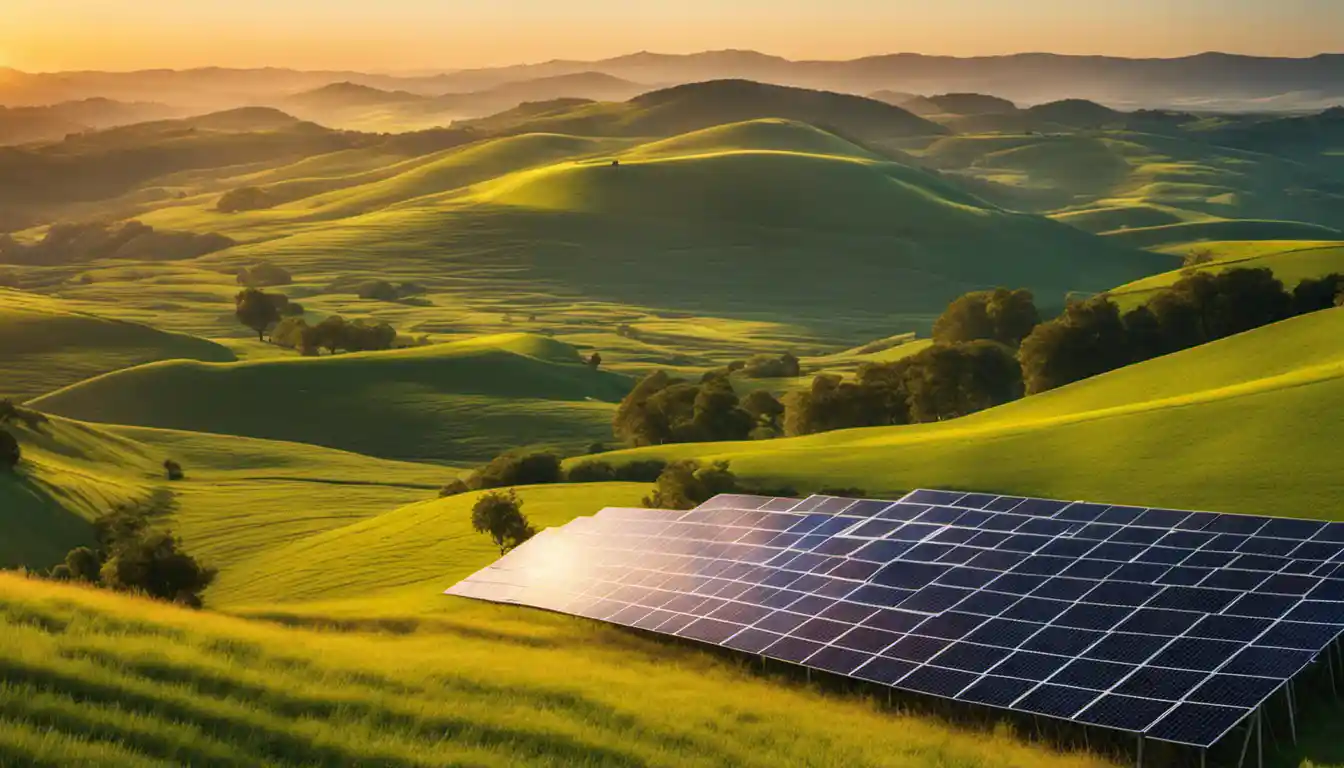Understanding Off Grid Solar Systems
Excess electricity generated from off-grid solar panels is typically stored in a battery storage system for later use, especially during the night or cloudy days when the panels aren’t producing energy. If the batteries become full, the excess electricity can sometimes be dissipated through a diversion load such as a water or space heater.
Definition and Design of Off Grid Solar Systems
Imagine feeling free from the grasp of your local utility company, harnessing the power of the sun to light your home even in remote locations. Enter, the off-grid solar system.
Simply put, an off-grid solar system, as explained in my previous article What is Off Grid Solar System, is a stand-alone power system that provides electricity to your home without any connection to the public grid. These systems are designed with solar panels, battery banks, inverters, and often a backup generator to ensure you always have access to power whether it’s sunny, raining, or snowing.
The Role of Solar Panels in Off Grid Solar Systems
Solar panels are the main star of the powerhouse that is an off-grid solar system. They capture the sun’s radiance and transform it into a usable form of energy, becoming our personal power station. This process makes you the maestro of your own symphony of energy production.
The Importance of Battery Banks in Off Grid Solar Systems
Battery banks are like the diligent librarians of the power world. They carefully ‘store’ our excess energy until we’re ready to ‘check it out’ for use in our homes then neatly ‘reshelve’ the surplus energy back for later use. Their role in handling excess electricity in off grid solar systems is critical.
Dealing With Excess Solar Power
What Happens If Solar Panels Produce Too Much Power?
Solar panels aren’t like an appliance with an on-off switch. When the sun is shining, they’re constantly working hard, creating a situation where they sometimes churn out more electricity than we can use or store. That’s when the question about ‘what happens to excess electricity from solar panels off grid’ gains momentum.
Mechanism of Power Overflow in Solar Panels
Overflow is rather straightforward. The solar panels collect sunlight and convert it into electricity until the energy demand is satiated. Once all systems are powered and the battery storage is full, the additional power needs to ‘overflow’ somewhere. If your system doesn’t have a specific way to deal with the overflow, this could lead to overcharging the batteries, thus shortening their lifespan.
How Excess Power is Managed in Off Grid Systems

Battery Storage for Excess Solar Power
The off-grid solar systems are designed to use battery banks to reserve any excess electricity. It’s like having a pocket full of sunshine you can reach into when you need it the most, such as during the long winter nights or cloudy days.
Capacity of Battery Banks and Their Role in Handling Excess Energy
However, just like your pocket can only hold so many coins, battery banks have a limit. Once filled to their capacity, they cannot store any more energy.
Active Power Curtailment and its Function
Batteries today often come equipped with Active Power Curtailment. In simple terms, it acts like a wise old sheriff in an old western movie, controlling the turbulent tide of energy inflow and stopping any more from trying to enter the already full battery bank.
Implications of Excess Power in Off Grid Systems
The Possible Risk of Overcharging Batteries
Imagine your battery bank as a water tank. If water continually flows into the tank without check, it’s bound to overflow. Similarly, uncontrolled excess energy can lead to the overcharging of batteries, thus resulting in reduced lifespans and, in extreme cases, critical failure of the battery system.
How Overcharged Batteries Can Be Prevented
Fortunately, overcharging can be prevented with adequate system design. Just like adding an overflow outlet to our water tank example, adjusting the power inflow rate based on battery capacity can safeguard against overcharging scenarios.
Potential Wastage of Excess Solar Power
Without proper mechanisms, the surplus electricity generated by off-grid solar panels can go to waste, something we all aim to avoid since harnessing solar energy is all about reducing wastage and increasing sustainability.
Solutions to Effectively Utilize Excess Power

Building Electric Vehicle Charging Stations with Excess Power
One innovative way to utilize excess power is to use it to charge electric vehicles (EVs). Think of it as directing the overflow of water from the tank to irrigate a garden.
Installing Additional Battery Banks
Alternatively, you can expand your storage capacity by adding more battery banks. It’s like adding more space to your pocket to hold the surplus of monetary fortune.
Donating Your Excess Solar Energy
An uncommon, yet progressive approach could be to donate your excess solar energy to neighboring rural or tribal communities. It’s a community-centric solution to put your overflow of energy to good use.
Off Grid Solar Diverter: Managing Excess Power Efficiently
Understanding the Purpose and Function of an Off Grid Solar Diverter
An Off Grid Solar Diverter, a brilliant energy traffic controller, diverts the excess electricity from the batteries towards other loads like heating water or powering HVAC systems when the batteries become full.
How Solar Diverter Helps in Efficient Power Utilization
Just like an expert juggler, the Off Grid Solar Diverter flawlessly manages the inflow and outflow of electricity. It uses any excess energy efficiently, ensures that none of it goes to waste, and keeps your battery bank healthy by preventing overcharging.
Conserving Energy with Solar Diverter in Off Grid Systems

The goal here is always to optimize power usage, and a solar diverter does just that. It’s a peacemaker, settling the energy conflict between power producers (solar panels) and power consumers (your home appliances) intuitively, ensuring that everything works harmoniously.
Key Considerations When Managing Excess Solar Power
The Importance of Monitoring Real-World Data of an Off Grid System
Keeping a close eye on the performance of your off-grid system provides critical insights and helps in fine-tuning for optimum results. Practice the mantra of “Monitor, Analyze & Improve” regularly.
Evaluating the Number of Solar Panels for Optimal Energy Generation
“Too many cooks spoil the broth” is equally applicable when considering the number of solar panels you need. An appropriate number of panels will generate adequate energy while avoiding the headache of managing considerable excess power.
Recognizing the Potential of Solar Energy and Reducing Wastage
The quest to understand ‘What happens to excess electricity from solar panels off grid’ culminates in realizing the enormous potential of solar energy and the crucial need to avoid wastage.
Final Thoughts: Streamlining Power Management in Off Grid Solar Systems
The Contribution of Effective Power Management to Sustainability
Effective management of excess power ensures that all the energy generated by an off-grid solar system is utilized, promoting sustainability and making the most out of the sun’s abundant gift.
Moving Towards Self-Sufficiency with Off Grid Solar Systems
With proper planning and system design, your off-grid solar system can efficiently handle excess power, moving you towards self-sufficiency and giving you control over your own energy production.
In this transformative era of powering homes with solar energy, understanding ‘what happens to excess electricity from solar panels off grid’ allows us to harness this free resource optimally, ensuring a vibrant and sustainable world for future generations.



